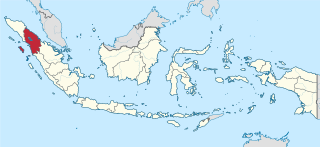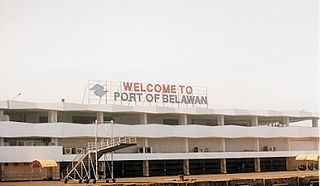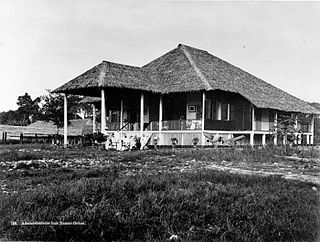
Medan is the capital and largest city of the Indonesian province of North Sumatra. A regional hub and financial centre of Sumatra, it is one of the four main central cities of Indonesia, alongside Jakarta, Surabaya, and Makassar. As of the 2020 Census, Medan has a population of 2,435,252 within its city limits, and over 3.4 million in its built-up urban area, making it the fourth largest urban area in Indonesia. The Medan metropolitan area—which includes neighbouring Binjai, Deli Serdang Regency, and a part of Karo Regency—is the largest metropolitan area outside of Java, with 4,744,323 residents counted in the 2020 Census. Medan is a multicultural metropolis and a busy trading city bordered by the Strait of Malacca. A gateway to the western part of Indonesia, Medan is supported by the Port of Belawan and Kualanamu International Airport, both of which are connected to the city centre via toll roads and railways.

North Sumatra is a province of Indonesia located on the northern part of the island of Sumatra. Its capital and largest city is Medan. North Sumatra is the fourth most-populous province after West Java, East Java and Central Java. The province covers an area of 72,981 km2. According to the 2020 population census, the province had a population of 14,799,361.

Binjai, formally Kota Binjai, is an independent city in the North Sumatra province of Indonesia, bordered by Deli Serdang Regency to the east and Langkat Regency to the west. Binjai is connected to Medan, about 22 km to the east, by the Sumatra highway that goes to Banda Aceh, and effectively forms a part of Greater Medan. The city's population was 181,904 in the 1990 Census, 224,516 in the 2000 Census, 246,154 in the 2010 Census, and 279,302 in the 2020 Census, comprising 139,284 males and 140,018 females. In 2020, a further 47,018 inhabitants lived in Binjai District of Langkat Regency, outside the city limits but immediately north of the city.

Deli Serdang is a regency in the Indonesian province of North Sumatra. It surrounds the city of Medan, and also borders the chartered city Binjai, which is effectively a bedroom community for Medan. It occupies an area of 2,497.72 sq.km. The capital of the district is Lubuk Pakam, which is located approximately 30 km east of Medan. The national census of 2000 recorded 1,573,987 people, but by 2010 the regency's population increased by 13.76% to 1,790,431, and at the 2020 Census the total was 1,931,441. Kualanamu International Airport is located in this regency.

PT Kereta Api Indonesia (Persero) is the sole operator of public railways in Indonesia. It is completely state-owned and pays track access charges to the government. The headquarters of KAI are located in Bandung, West Java.

Belawan is a harbor in Medan, North Sumatra. Located on the northeast coast of Sumatra, Belawan is Indonesia's busiest seaport outside of Java. It constitutes the most northerly of the city of Medan's 21 administrative districts (kecamatan), and covers an area of 29.44 km2; at the 2010 Census it had a population of 95,506.

Pangkalan Brandan (Pangkalanberandan) is a port town in Langkat Regency, North Sumatra province, Indonesia, forty miles north west of Medan, close to the boundary with Aceh. The area's population is estimated at around 21,000.

Langkat Regency is the northernmost regency of North Sumatra. Its seat is Stabat. Its area is 6,263.29 km2 and its population was 967,535 at the 2010 Census and 1,030,202 at the 2020 Census.

Stabat is a town in North Sumatra province of Indonesia and it is the seat (capital) of Langkat Regency. The town lies on the road between Medan and Banda Aceh, a short distance past the city of Binjai.

Medan Station is the main railway station in Medan, North Sumatra, Indonesia. In addition to intercity services operated by Indonesia's national rail operator, Kereta Api Indonesia, the station also has service to Kualanamu International Airport via Kualanamu ARS.

Schöma is a company based in Diepholz, Germany, specialising in the construction of small diesel locomotives.

(see also Wampú River )

Sei Bingai is a subdistrict of Langkat Regency. It borders Binjai to the north, Kuala and Salapian to the west, Deli Serdang Regency to the east, and Karo Regency to the south. Most people in Sei Bingai are Karo. A majority of people in Sei Bingai are Muslims, as the Karo are predominantly, but not entirely Christian in this area.
Kuala is a town and administrative district of Langkat Regency in northern Sumatra, Indonesia. It borders Selesai to the north, Salapian to the west, and Sei Bingai to the south and east. Most people in Kuala are Javanese people, with a significant Karo population. Although most Karo are Christian, many are also Muslim, and as the Javanese are nearly 100% Muslim, Kuala subdistrict is 80% Muslim.

Tamil Indonesians are persons from Indian Tamil ancestry living in Indonesia. Majority of them live in Medan in North Sumatra while there are small community in other parts of the country such as Jakarta, Aceh, Riau and Riau Islands. It is estimated that there are around 25,000 PIOs/NRIs living in Indonesia of which the Indian expatriate community registered with the Embassy and Consulate in Medan numbers around 30,000.

N.V. Deli Spoorweg Maatschappij, was a private railway company that operated near the east coast of Sumatra around Deli. The Deli Company established itself as a tobacco plantation and then expanded into tea, rubber and timber products. The company was founded in 1883. Routes were built in cape gauge. It was the last remaining private Dutch railway when it was taken over by the state network Indonesian Railway Company in 1957.

Binjai Station, (BIJ)—formerly known as Timbang Langkat Station—is railway station located in Binjai, in the area near Binjai Bus station. The station is located at an elevation of +29.30 m (96.1 ft) and is situated in the Regional Division Railway I North Sumatra and Aceh. Unlike most other stations in North Sumatra which have different architecture, Binjai station still remains a colonial-style building from the time of its first construction.

Bakrie Sumatera Plantations is an agricultural subsidiary of Bakrie Group headquartered in Jakarta, Indonesia. Bakrie Sumatera Plantations manages an estimated one hundred thousand hectares of rubber and palm oil plantations, a railroad for transporting rubber, and several land banks.
Karo United Football Club is an Indonesian football club based in Kabanjahe, Karo Regency, North Sumatra. They currently compete at Liga 3.


























